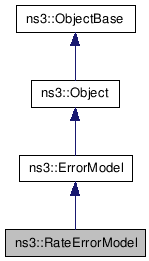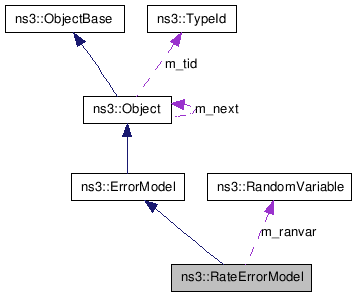ns3::RateErrorModel Class Reference
Determine which packets are errored corresponding to an underlying distribution, rate, and unit. More...
#include <error-model.h>
Inheritance diagram for ns3::RateErrorModel:

Collaboration diagram for ns3::RateErrorModel:

Public Member Functions | |
| enum ErrorUnit | GetUnit (void) const |
| void | SetUnit (enum ErrorUnit error_unit) |
| double | GetRate (void) const |
| void | SetRate (double rate) |
| void | SetRandomVariable (const RandomVariable &ranvar) |
Static Public Member Functions | |
| static TypeId | GetTypeId (void) |
| This method returns the TypeId associated to ns3::RateErrorModel. | |
Detailed Description
Determine which packets are errored corresponding to an underlying distribution, rate, and unit.This object is used to flag packets as being lost/errored or not. The two parameters that govern the behavior are the rate (or equivalently, the mean duration/spacing between errors), and the unit (which may be per-bit, per-byte, and per-packet). Users can optionally provide a RandomVariable object; the default is to use a Uniform(0,1) distribution.
Reset() on this model will do nothing
IsCorrupt() will not modify the packet data buffer
Member Function Documentation
| double ns3::RateErrorModel::GetRate | ( | void | ) | const |
- Returns:
- the error rate being applied by the model
| static TypeId ns3::RateErrorModel::GetTypeId | ( | void | ) | [static] |
This method returns the TypeId associated to ns3::RateErrorModel.
This object is accessible through the following paths with Config::Set and Config::Connect:
- /NodeList/[i]/DeviceList/[i]/$ns3::CsmaNetDevice/ReceiveErrorModel/$ns3::RateErrorModel
- /NodeList/[i]/DeviceList/[i]/$ns3::PointToPointNetDevice/ReceiveErrorModel/$ns3::RateErrorModel
-
ErrorUnit: The error unit
- Set with class: ns3::EnumValue
- Underlying type: EU_BYTE|EU_PKT|EU_BIT
- Initial value: EU_BYTE
- Flags: construct write read
-
ErrorRate: The error rate.
- Set with class: ns3::DoubleValue
- Underlying type: double -1.79769e+308:1.79769e+308
- Initial value: 0
- Flags: construct write read
-
RanVar: The decision variable attached to this error model.
- Set with class: RandomVariableValue
- Underlying type: RandomVariable
- Initial value: Uniform:0:1
- Flags: construct write read
-
IsEnabled: Whether this ErrorModel is enabled or not.
- Set with class: BooleanValue
- Underlying type: bool
- Initial value: true
- Flags: construct write read
Reimplemented from ns3::ErrorModel.
| enum ErrorUnit ns3::RateErrorModel::GetUnit | ( | void | ) | const |
- Returns:
- the ErrorUnit being used by the underlying model
| void ns3::RateErrorModel::SetRandomVariable | ( | const RandomVariable & | ranvar | ) |
- Parameters:
-
ranvar A random variable distribution to generate random variates
| void ns3::RateErrorModel::SetRate | ( | double | rate | ) |
- Parameters:
-
rate the error rate to be used by the model
| void ns3::RateErrorModel::SetUnit | ( | enum ErrorUnit | error_unit | ) |
- Parameters:
-
error_unit the ErrorUnit to be used by the underlying model
The documentation for this class was generated from the following files:
- src/common/error-model.h
- doc/introspected-doxygen.h
 1.5.8
1.5.8